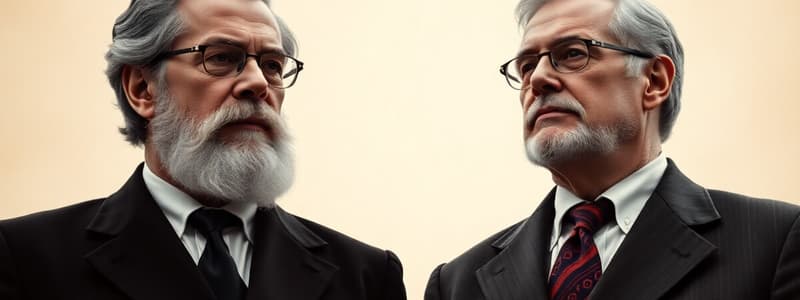Podcast
Questions and Answers
What is the primary belief of classical conservatism?
What is the primary belief of classical conservatism?
- Radical changes to improve societal equality
- Universal suffrage for all citizens
- Total government ownership of production
- A government that protects traditions and societal well-being (correct)
Which key figure is associated with classical conservatism and opposed radical change?
Which key figure is associated with classical conservatism and opposed radical change?
- Thomas Paine
- Karl Marx
- Friedrich Engels
- Edmund Burke (correct)
How does modern socialism differ from classical socialism?
How does modern socialism differ from classical socialism?
- It solely relies on charity for welfare
- It includes some degree of private ownership with government intervention (correct)
- It rejects any form of government services
- It completely abolishes private ownership
What was the main purpose of the Co-operative Commonwealth Federation (CCF)?
What was the main purpose of the Co-operative Commonwealth Federation (CCF)?
What do Utopian Socialists advocate for in industrial societies?
What do Utopian Socialists advocate for in industrial societies?
Flashcards
Classical Conservatism
Classical Conservatism
A political ideology that values tradition, stability, and social order. It favors a limited electorate, rule by educated elites, and a strong government.
Edmund Burke
Edmund Burke
An 18th-century philosopher who opposed the French Revolution. He believed in strong traditions, gradual change, and that government should be led by experienced elites.
Socialism
Socialism
A political ideology that seeks to create a more equitable society by giving workers control over the means of production and promoting equal distribution of wealth.
Co-operative Commonwealth Federation (CCF)
Co-operative Commonwealth Federation (CCF)
Signup and view all the flashcards
Utopian Socialists
Utopian Socialists
Signup and view all the flashcards
Study Notes
Classical Conservatism
- Classical conservatism is a reaction against classical liberalism.
- It advocates for a government that protects traditions and societal well-being.
- It supports rule by educated elites and a limited electorate, opposing universal suffrage.
Edmund Burke
- Edmund Burke was a key figure in conservatism.
- He opposed the French Revolution and radical change.
- He believed that wise, experienced elites should lead the government and that not everyone should participate in government.
- He valued tradition and the status quo.
Socialism
- Socialists believe workers should own the means of production.
- They aim for equal wealth distribution, rejecting the inequality inherent in classical liberalism.
- Modern socialism, or democratic socialism, allows for some private ownership but advocates for substantial government intervention and higher taxes for a welfare state, offering services that span from birth to death.
Co-operative Commonwealth Federation (CCF)
- The CCF was a political party formed during the Great Depression.
- It advocated for social programs including shelters, job creation, pensions, and government-funded healthcare.
- The party gained power in Saskatchewan in 1944.
Utopian Socialists
- Utopian socialists were humanitarians who sought to resolve worker exploitation in industrial societies.
- They promoted universal education and improved working conditions to achieve a happy society for everyone.
Studying That Suits You
Use AI to generate personalized quizzes and flashcards to suit your learning preferences.
Description
This quiz explores the fundamental concepts of classical conservatism and socialism, highlighting key figures like Edmund Burke and their contrasting views on government and societal organization. Test your understanding of these political ideologies and their implications in modern society.




